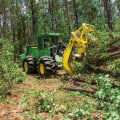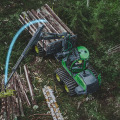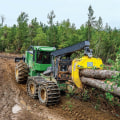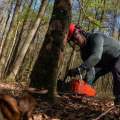In the realm of forestry equipment in Omaha, the significance of irrigation sprinkler installation cannot be overstated. The thoughtful integration of sprinkler systems is not merely a matter of convenience but a fundamental necessity for the vitality and sustainability of the region's trees. By addressing critical aspects such as water distribution and conservation, irrigation systems become indispensable allies in the quest for optimal tree health and equipment longevity. The intricate relationship between irrigation and forestry equipment unveils a compelling narrative that underscores the pivotal role of these systems in the ecosystem.
What Are The Benefits Of Irrigation Sprinkler Installation For Forestry Equipment
Forestry equipment plays a vital role in maintaining and managing forests efficiently. When it comes to the benefits of irrigation sprinkler installation for forestry equipment, water conservation and efficiency are at the forefront. By utilizing irrigation systems, forests can be watered precisely and effectively, leading to optimal growth and health of trees. This targeted approach reduces water waste and promotes conservation, making the most out of this valuable resource.
In addition to water conservation, irrigation sprinkler installation offers cost savings and improved maintenance for forestry operations. By automating the watering process, labor costs are reduced, and resources are utilized more efficiently. This results in long-term savings for forestry businesses and ensures that trees receive the necessary hydration for their growth and development.
The integration of technology and innovation into irrigation systems for forestry equipment enhances overall performance. Smart technology allows for precise monitoring and control of water distribution, ensuring that each tree receives the right amount of water at the right time. Innovations in irrigation systems continue to advance, providing forestry professionals with tools to optimize their operations and maximize the health of the forest ecosystem.
How Does Proper Irrigation Help Maintain The Health And Growth Of Trees In The Forestry Industry
Proper irrigation is crucial for maintaining the health and growth of trees in the forestry industry. Trees, like all plants, require water to survive and thrive. Without adequate water, trees may become stressed, leading to reduced growth, susceptibility to pests and diseases, and even death.
One of the main benefits of proper irrigation is that it ensures that trees receive the right amount of water at the right time. This helps to prevent under-watering, which can lead to drought stress and stunted growth, as well as over-watering, which can cause root rot and other diseases. By providing trees with a consistent and appropriate amount of water, irrigation helps to maintain optimal soil moisture levels, allowing roots to absorb nutrients efficiently and support healthy growth.
Proper irrigation also helps to promote the development of strong and deep root systems. Trees with well-developed root systems are better able to access water and nutrients from the soil, making them more resilient to environmental stresses such as drought and extreme temperatures. Additionally, deep root systems help to anchor trees in the soil, reducing the risk of windthrow and other forms of physical damage.
In the forestry industry, proper irrigation is particularly important for newly planted trees, as they are more vulnerable to water stress and other environmental factors. By providing young trees with the water they need to establish themselves and grow, irrigation helps to ensure their long-term health and survival. Proper irrigation can also benefit mature trees, helping them to maintain their vigor and productivity over time.
Proper irrigation plays a critical role in maintaining the health and growth of trees in the forestry industry. By providing trees with the water they need to thrive, irrigation helps to support strong root systems, healthy growth, and overall resilience to environmental stresses. Through careful monitoring and management of irrigation practices, foresters can help to ensure the long-term health and productivity of forest ecosystems.
What Are The Key Considerations To Keep In Mind When Planning For Irrigation Sprinkler Installation For Forestry
When planning for irrigation sprinkler installation in forestry settings, it is crucial to consider several key factors that can significantly impact the effectiveness and efficiency of the irrigation system. Water efficiency is paramount to ensure that the trees receive adequate hydration without wastage. Proper maintenance of the sprinkler system is essential to prevent clogging or malfunctions that could hinder its performance and potentially harm the trees.
The health of the soil plays a vital role in tree growth. Understanding the soil composition and its moisture retention capabilities is crucial when designing the irrigation system to ensure that the trees receive the necessary nutrients for optimal growth. The irrigation system should be tailored to promote soil health and support the overall well-being of the trees.
Considering the budget and timeline is also essential when planning for irrigation sprinkler installation in forestry. Developing a realistic budget that accounts for the cost of the system, installation, and ongoing maintenance is vital to ensure the long-term sustainability of the irrigation system. Establishing a timeline for the installation process helps in efficient planning and execution, ensuring that the irrigation system is operational when needed to support the forestry equipment effectively.
What Role Does A Sprinkler System Installer Play In Ensuring The Effectiveness Of The Irrigation System For Forestry Equipment
A sprinkler system installer plays a crucial role in ensuring the effectiveness of the irrigation system for forestry equipment. Their expertise and knowledge are essential in designing, installing, and maintaining the sprinkler system to ensure that it meets the specific needs of the forestry operation.
The sprinkler system installer works closely with the forestry equipment operator to understand the specific requirements of the operation. They will assess factors such as the size of the area to be irrigated, the type of soil, the water source, and the specific needs of the trees or plants being irrigated. Based on this information, the installer will design a sprinkler system that is tailored to meet these requirements.
Once the design is finalized, the sprinkler system installer will proceed with the installation process. This involves laying out the irrigation pipes, installing the sprinkler heads, and connecting the system to the water source. The installer will ensure that the system is installed correctly and is functioning properly to effectively water the forestry equipment.
After the installation is complete, the sprinkler system installer will test the system to ensure that it is delivering water evenly and efficiently to all areas of the forestry equipment. They will make any necessary adjustments to the system to optimize its performance and ensure that it is meeting the specific watering needs of the trees or plants.
A sprinkler system installer plays a critical role in ensuring the effectiveness of the irrigation system for forestry equipment. By working closely with the forestry equipment operator and providing ongoing support, the sprinkler system installer helps to maximize the efficiency and effectiveness of the irrigation system for forestry operations.
What Are Some Key Factors To Consider When Choosing A Sprinkler System Installer
Selecting the right sprinkler system installer for forestry equipment requires careful consideration of several key factors to ensure the successful installation and maintenance of the irrigation system. The installation process is a critical aspect to evaluate when choosing a sprinkler system installer. It is essential to select a provider with expertise in installing irrigation systems specifically designed for forestry equipment to ensure proper functionality and efficiency.
Maintenance requirements should also be taken into account. A reputable installer should not only offer installation services but also provide maintenance and repair services to keep the sprinkler system in optimal condition. This includes regular inspections, adjustments, and necessary repairs to prevent downtime and ensure the system operates effectively.
Cost considerations are another crucial factor when selecting a sprinkler system installer for forestry equipment. While it is important to stay within budget, it is equally essential to prioritize quality and reliability. Opting for the cheapest option may result in subpar installation and maintenance services, leading to costly issues in the long run. Therefore, it is advisable to weigh the costs against the expertise and reputation of the installer to make an informed decision that ensures the longevity and effectiveness of the irrigation system for forestry equipment.
Contact A Irrigation Sprinkler Installer In Omaha
If you need irrigation sprinkler installation services in Omaha, look no further than Millard Sprinkler. With years of experience in the industry, they have the expertise to handle all of your forestry equipment needs.
Whether you are looking to install a new sprinkler system for your trees or maintain an existing one, Millard Sprinkler has the knowledge and resources to get the job done right. Their team of skilled professionals will work with you to design a custom irrigation solution that meets your specific needs and budget.
From selecting the right equipment to installing and maintaining your sprinkler system, Millard Sprinkler will ensure that your trees receive the proper amount of water to thrive. They understand the importance of proper irrigation for the health and growth of your trees and will go above and beyond to deliver exceptional service. Contact Millard Sprinkler today to schedule a consultation with a knowledgeable irrigation sprinkler installer in Omaha.







